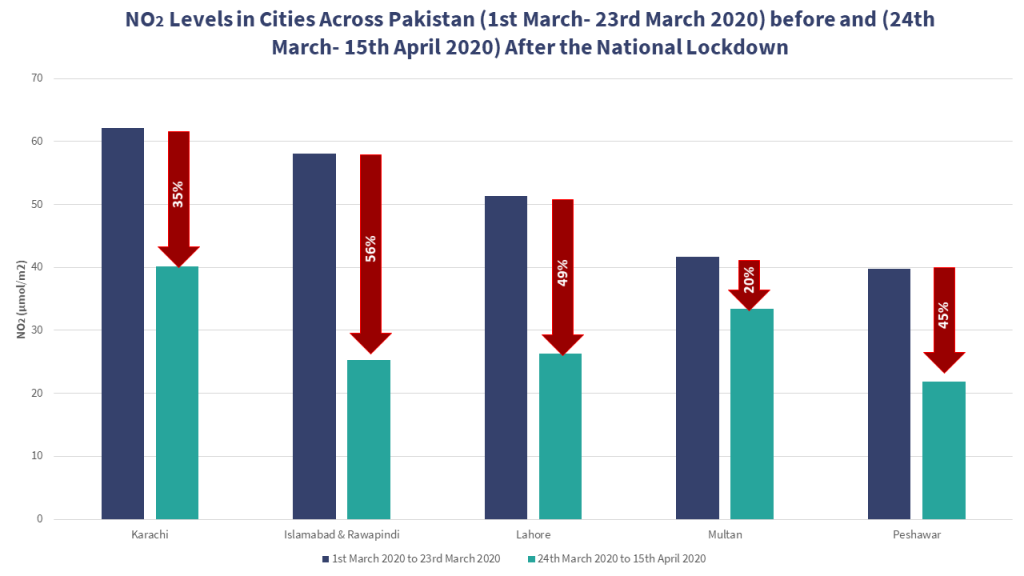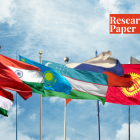Tooba is an undergraduate student studying English language and literature at the University of Central Punjab.
The Pandemic of the 21st Century
The Covid–19 pandemic takes its name after a strain of virus called the coronavirus that began its onslaught in China in December 2019. The virus has now affected every part of the earth, including Pakistan. The coronavirus seems to have ravaged everything in its wake except the environment.
Pakistan has a total of over 343,000 confirmed active cases. The government of Pakistan has made all possible arrangements for the prevention and elimination of this disease. Even with meager resources, it has succeeded in constructing hospitals, laboratories for testing, quarantine facilities, and running awareness campaigns.
Coronavirus Restores the Environment
As the number of coronavirus patients increased, the concerned governments and public health departments took preventive measures and ordered everyone to quarantine themselves. Due to stay-at-home orders, all schools, offices, businesses, restaurants, and other public places had to limit their activities, with some completely shutting down. Even the airlines had to reduce their flights by 60% to 95%.
With this sudden drop in activity, fuel consumption, and reduction in greenhouse gas emissions, there has been a dramatic improvement in the air quality of the world’s major cities. It seems that the coronavirus has resolved to reduce the pollution in our environment. This kindles hope that the reduction in fuel consumption and the consequent gas emissions over a substantial amount of time could reverse impending climate change.
The Air Cleanses Itself
Pakistan does not have real-time ambient air quality data and thus there is little understanding of the impacts of policies such as a country-wide lockdown or other interventions on air quality. However, with technological advances, advancements in remote sensing, and acquisition of data from satellites, researchers and analysts have assessed prevailing pollution levels without much of the ground pollution monitoring data available.
Before the global lockdown, two of Pakistan’s cities were placed in the top five cities with the worst air quality levels, according to IQAir’s 2019 World Air Quality Report. Following the lockdown, there had been considerable improvement in the air quality of Pakistan, owing to reduced fossil fuel consumption and the closure of industries and power plants, among others.

According to the data available on the website of Centre for Research on Energy and Clean Air, nitrogen dioxide levels in major cities of Pakistan have decreased after lockdown from 24th March to 15th April 2020. Islamabad and Rawalpindi exhibit the greatest improvement, with a decrease of NO2 levels by 56%. The aforesaid data has been acquired by the TROPOMI- Sentinel-5P satellite.
Air pollution has significantly dropped due to the shutdown of industrial operations and a decrease in vehicular mobility to 65% across Pakistan during the lockdown. The reduction in the nitrogen dioxide levels in Pakistan has stemmed cases of childhood asthma and premature deaths, which had 120,000 and 4,000 new cases respectively each year.
Natural Water Purification
The coronavirus has been successful in thwarting the continuing seawater contamination in our environment. Due to the lockdown, many industries stopped operating and thus stopped releasing wastes into the sea. Before the lockdown, there were 11 sewage channels and rainy rivers flowing from different parts of Karachi including Liyari, Malir, and Sukhan that entered the sea. However, they have either been closed or carry low volumes of water.
According to the reports from coastal area activists and marine experts, seawater was expected to witness a complete change within at least two months of the lockdown continues, improving water quality and proving to be beneficial for the mangrove plants and marine species. It is reported that before the lockdown the coast had been receiving around 500 million gallons daily (MGD) waste flowing from both industrial and municipal sewerage lines.
The Wildlife
With the improvement in the air and water quality and the reduction in land waste due to the social and industrial lockdown, the natural habitats of animals are no longer under threat. Animal life has thrived and seen growth ever since the lockdown in Pakistan. Rangers reported an increase in animal activity from Pakistan’s Margalla Hills National Park in May 2020.
Sakhawat Ali, Islamabad’s assistant wildlife director, has said that the park was home to 38 mammal species, 350 bird species, and 34 reptile species that include snakes of as many as 27 types. He further reported that they had already noticed new creatures as well, for instance, new species of butterflies that had recently been observed.
Dr. Anisur Rahman, Chairman of the Islamabad Wildlife Management Board, reported that they had observed around 30 percent more wildlife at Margalla Hills National Park, and that wildlife had already been there but concealed themselves because of frequent human crowds.
After the park was closed to the public, some animals showed up that were previously thought to be endangered, including a leopard. The wildlife department had also been able to analyze the behavior of animals more than they have ever done before the lockdown; they have recorded footage of birds’ mating dances in the mating season.
Those Under the Sea
Overfishing has come to a stop thus saving hundreds of species of fish from extinction. A community activist from Ibrahim Hydri confirmed that the coastal communities were finally able to breathe fresh and toxin-free air. He pointed out that overfishing by commercial fishing vessels had increased the exploitation of resources like mangroves, and had destroyed fish reserves.
Despite its disasters, coronavirus has slightly restored a balance in our environment, and it has caused nature to bloom again. It’s as if nature is reclaiming what it owns, and other species bask in the freedom that they’ve been granted. It has given us hope that the drastic climate change and the threats it has posed can be reversed.
If you want to submit your articles and/or research papers, please check the Submissions page.
The views and opinions expressed in this article/paper are the author’s own and do not necessarily reflect the editorial position of Paradigm Shift.



















